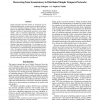Free Online Productivity Tools
i2Speak
i2Symbol
i2OCR
iTex2Img
iWeb2Print
iWeb2Shot
i2Type
iPdf2Split
iPdf2Merge
i2Bopomofo
i2Arabic
i2Style
i2Image
i2PDF
iLatex2Rtf
Sci2ools
111
click to vote
FLAIRS
2008
2008
Recovering from Inconsistency in Distributed Simple Temporal Networks
Simple Temporal Networks (STNs) are frequently used in scheduling applications, as they provide a powerful and general tool for managing temporal constraints. One obstacle to their use in multi-agent scheduling contexts, however, is the additional problem of maintaining consistency across agent models. Like in centralized applications, unexpected execution results (e.g., an activity taking longer to execute than planned) can introduce conflicts into an agent's local model that require changes to its current local schedule. But in a distributed environment these local changes must also be propagated to those other agents with interdependent decisions, and the asynchrony and latency of this communication can introduce inter-agent inconsistency. In this paper, we consider the problem of managing and recovering from detected inconsistencies in a distributed STN-based scheduling framework. Our approach exploits a higher, domain-level semantics of the temporal constraints posted in the...
Artificial Intelligence | FLAIRS 2008 | Multi-agent Scheduling Contexts | Simple Temporal Networks | Temporal Constraints |
Related Content
| Added | 02 Oct 2010 |
| Updated | 02 Oct 2010 |
| Type | Conference |
| Year | 2008 |
| Where | FLAIRS |
| Authors | Anthony Gallagher, Stephen F. Smith |
Comments (0)

